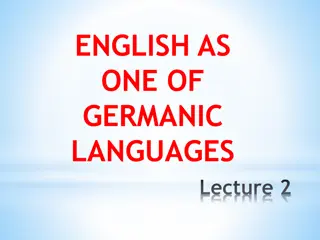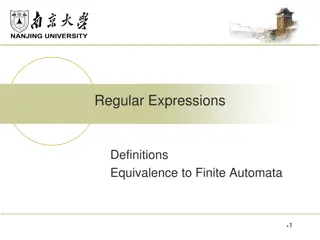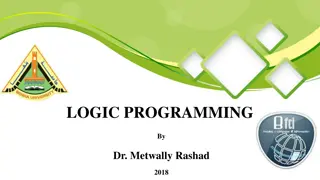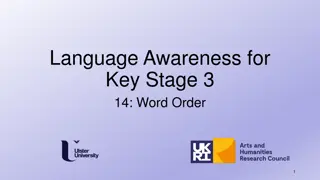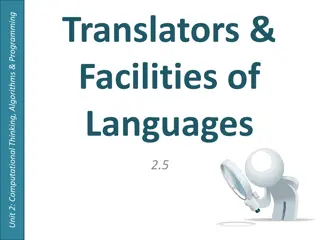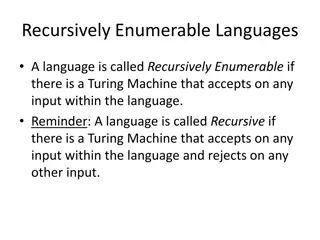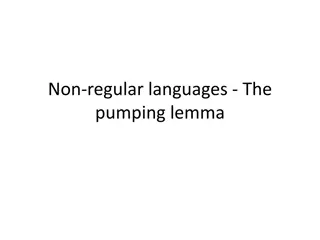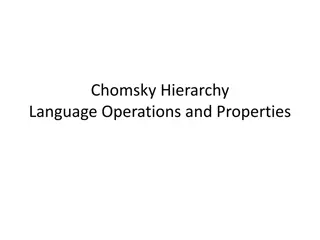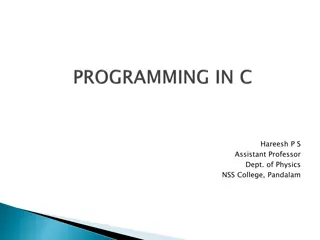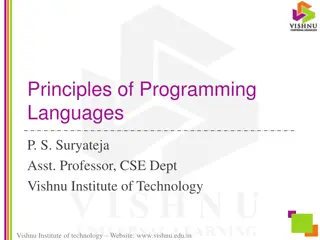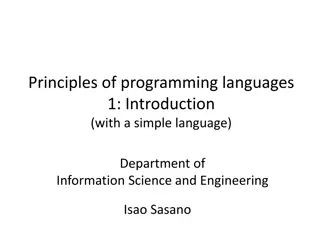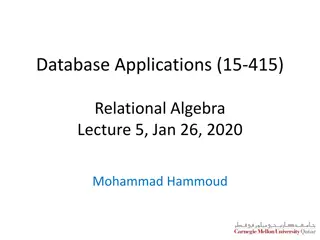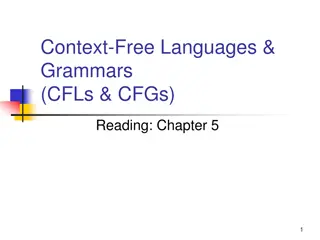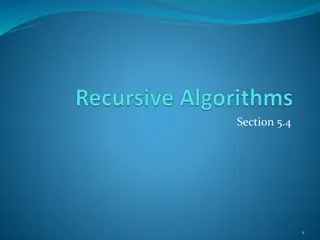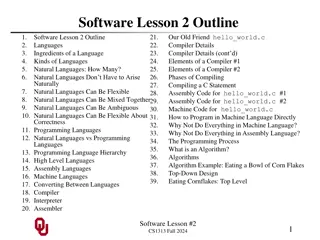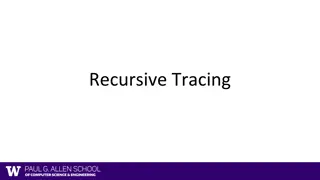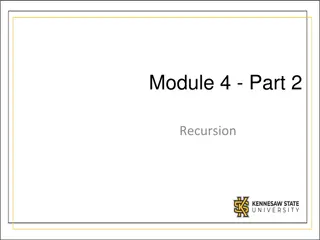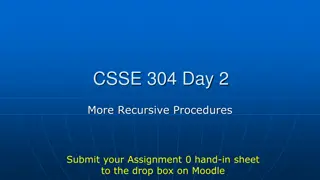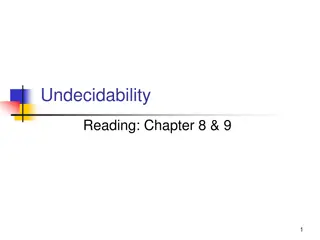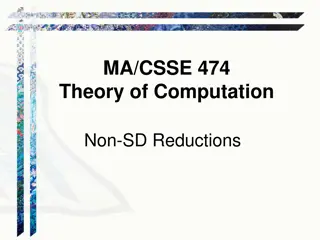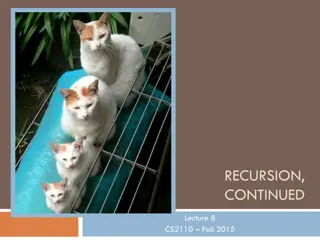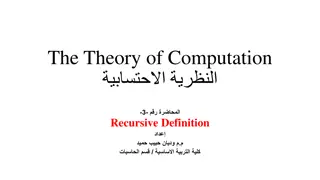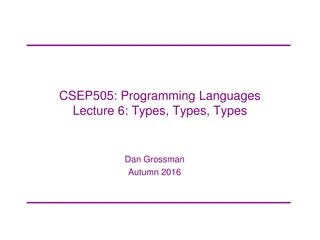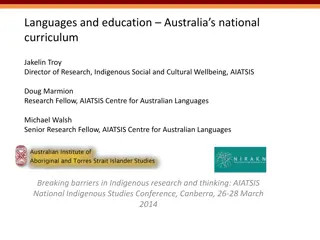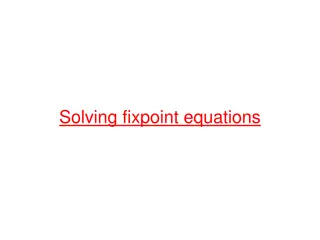Exploring Germanic Tribes and Languages in History
Delve into the ancient Germanic tribes and languages, their territories, movements during the Migration Period, surviving languages, writing systems, and encounters with prominent historical figures like Roman generals. Learn about the earliest mentions of Germans by Greek travelers and astronomers,
3 views • 35 slides
Introduction to Regular Expressions and Equivalence to Finite Automata
Regular expressions (REs) are used to describe languages by algebra and are equivalent to finite automata. They define regular languages precisely using operations like union, concatenation, and Kleene star. The concatenation of languages combines strings from two languages, while the Kleene star re
9 views • 106 slides
European Day of Languages QUIZ
Explore interesting facts about languages in the world through a quiz. Discover the number of living languages, the origins of written language, official languages like Azeri, and the history of sign languages. Test your knowledge on the European Day of Languages!
6 views • 24 slides
Understanding Logic Programming and AI Principles
This course focuses on logic programming principles applied to AI problems. Topics include Prolog programming, backtracking, recursive rule definition, built-in predicates, lists manipulation, and advanced techniques. Declarative languages like Prolog differ from procedural languages by describing p
1 views • 26 slides
Understanding Word Order in Different Languages
Explore the fascinating world of word order in languages. Discover how different languages arrange words in various ways, such as Subject-Verb-Object (SVO), Subject-Object-Verb (SOV), and more. Delve into the diversity of word orders for subjects, objects, and verbs, and uncover how language structu
2 views • 31 slides
Understanding Programming Languages and Translators in Computational Thinking
Programming languages are categorized into generations, from low-level machine code to high-level languages. Translators like assemblers, compilers, and interpreters help convert code for computer execution. Each generation has its characteristics and purposes, affecting ease of programming, debuggi
1 views • 18 slides
Understanding Recursive vs Recursively Enumerable Languages
Comparison between recursive and recursively enumerable languages in terms of Turing Machines acceptance, decidable languages, recognizable languages, and partial predicates. Explains the concepts with examples and how Turing Machines decide membership in languages.
0 views • 8 slides
Understanding Non-Regular Languages and the Pumping Lemma
Dive into the world of regular and non-regular languages, exploring the concept of the pumping lemma. Learn about different types of non-regular languages and why some languages require an infinite number of states to be represented by a finite automaton. Find out why mathematical proofs are essenti
0 views • 62 slides
Understanding Chomsky Hierarchy in Language Theory
Explore Chomsky Hierarchy in language theory, including different types of languages, grammars, and automata. Learn how to prove if a language is regular, context-free, recursive, or recursively enumerable. Understand the closure properties of regular, context-free, recursive, and recursively enumer
2 views • 10 slides
Overview of Grammar Types and Chomsky Hierarchy
The four types of grammars are General, Context-Sensitive, Context-Free, and Linear grammars, each recognizing a specific set of languages. Chomsky Hierarchy categorizes these grammars into four levels, indicating subsets of languages they can recognize. Context-free grammars have specific productio
0 views • 17 slides
Understanding Formal Semantics of Programming Languages: From Lambda Calculus to Separation Logic
Explore the foundational concepts of formal semantics in programming languages, covering Lambda Calculus, Untyped and Simply-typed languages, Imperative languages, Operational and Hoare logics, as well as Separation logic. Delve into syntax, reduction rules, typing rules, and operational semantics i
7 views • 14 slides
Understanding Programming Languages: Levels and Basics
Programming languages facilitate communication between humans and computers, with machine language being the fundamental binary code understood by computers. Different levels of programming languages exist, from low-level machine language to high-level languages like C. Natural languages are meant f
0 views • 35 slides
Principles of Programming Languages at Vishnu Institute of Technology
Introduction to Principles of Programming Languages course including prerequisites, objectives, outcomes, and syllabus at Vishnu Institute of Technology. The course covers key concepts, popular programming paradigms and languages, practical knowledge in lexical analysis and parsing, as well as writi
0 views • 43 slides
The Currency of Love: Importance of Communication and the 5 Languages of Love
Understanding the essence of love lies in effective communication and expressing love through the five languages - Words, Gifts, Actions, Time, and Physical Touching. Communication is depicted as the currency of love, essential for deepening bonds between partners. Gary Chapman's concept of the 5 La
4 views • 33 slides
Principles of Programming Languages: Introduction and Machine Language Overview
This material covers the basics of programming languages, including an introduction to a simple language, evaluation methods, and contact information for the instructor. It explains machine language, the native language of computers, and the transition to high-level programming languages. The benefi
0 views • 24 slides
Understanding the Tower of Hanoi Puzzle and its Recursive Solution
Tower of Hanoi is a classic game involving moving disks between three pegs, following specific rules. This article provides an introduction to the game, notations used, recursive approaches to solve it, and a detailed walkthrough for N=2 and N=3 scenarios. Explore the recursive steps, time complexit
0 views • 12 slides
Understanding Relational Query Languages in Database Applications
In this lecture, Mohammad Hammoud discusses the importance of relational query languages (QLs) in manipulating and retrieving data in databases. He covers the strong formal foundation of QLs, their distinction from programming languages, and their effectiveness for accessing large datasets. The sess
0 views • 39 slides
Understanding Context-Free Languages and Grammars
Context-Free Languages and Grammars (CFLs & CFGs) are essential in theoretical computer science, providing a framework for recognizing non-regular languages. This content explores the distinction between regular and context-free languages, delves into the construction of language recognizers using c
0 views • 40 slides
Understanding Merge Sort Algorithm in Computer Science
Explore the concept of the merge sort algorithm as a practical example of tree recursion. Learn how merging works, the steps involved in the merge algorithm, and how recursive merge sort can efficiently sort unsorted lists. Dive into the recursive implementation of merge sort and grasp its recursive
0 views • 22 slides
Mathematical Analysis of Algorithms in CMPE371 - Fall 2023-2024
Explore the mathematical analysis of algorithms in CMPE371 for Fall 2023-2024, focusing on non-recursive and recursive algorithms. Learn how to analyze non-recursive algorithms by deciding on input size parameters, identifying basic operations, and simplifying summations. Dive into recursive algorit
1 views • 31 slides
Recursive Algorithms in Computing
Explore recursive algorithms in computing, including the definition, examples like factorial, exponentiation, GCD, and modular exponentiation. Dive into the concept of solving problems by breaking them into smaller instances, ensuring termination with known solutions.
0 views • 16 slides
Understanding Languages in Software Development
Exploring the fundamentals of languages in software development, this content covers natural languages, programming languages, and the components of a language like symbols, grammar, and semantics. It delves into the differences between natural and programming languages, highlighting the essential r
0 views • 39 slides
Understanding Recursive Functions in Programming
Recursive functions in programming are powerful tools that can be used to solve complex problems by breaking them down into smaller, more manageable sub-problems. This content explores how recursive methods can be implemented using examples like the pool rack and division functions, showcasing the c
0 views • 15 slides
The Magic of Recursion in Programming
Discover the power of recursion in programming through insightful insights and examples. Explore recursive algorithms, methods, and the significance of believing in yourself as a programmer. Understand the crucial roles of arguments and parameters in methods, and delve into the intricacies of how me
0 views • 77 slides
Exploring Recursion in Computer Science
Exploring the concept of recursion in computer science, this chapter delves into its applications, advantages, and efficiency. From understanding recursive helper methods to analyzing problems suited for recursive solutions, this chapter covers the fundamental principles of recursion using examples
0 views • 86 slides
Understanding Recursive and Iterative Factorials through Tracing
This content provides an in-depth exploration of recursive and iterative factorial functions through tracing examples. The explanations are accompanied by visual aids to help conceptualize the iterative and recursive processes of calculating factorials. By comparing the two methods side by side, rea
0 views • 7 slides
Understanding Recursion in Programming
Recursion in programming involves a method calling itself to solve problems by breaking them down into simpler subproblems. The process requires a base condition, recursive calls, and progress towards termination. This technique is illustrated through examples like calculating factorials using recur
0 views • 64 slides
CSSE 304 Day 2 - Recursive Procedures and Assignment Submission
Explore the concepts of recursion in CSSE 304 Day 2, including writing recursive procedures, finding starting code, running tests, and solving tasks like finding medians and counting occurrences. Join breakout rooms for more practice and don't forget to submit your assignment on Moodle.
0 views • 8 slides
Understanding Recursive and Recursively Enumerable Languages
Exploring the concepts of decidability and undecidability in computer science, specifically focusing on Recursive and Recursively Enumerable (RE) languages. Recursive languages always halt, while RE languages may or may not halt, showcasing the differences between decidable and undecidable problems.
0 views • 35 slides
Understanding Non-SD Languages in Theory of Computation
Explore the concept of Non-SD languages in the theory of computation, which are larger in number compared to SD languages. Non-SD languages involve infinite search or analyzing whether a Turing Machine will loop indefinitely. Discover examples and insights into proving languages are not SD through c
0 views • 38 slides
Understanding Top-Down Parsing in Context-Free Syntax
Context-free syntax expressed with context-free grammar plays a key role in top-down parsing. This parsing method involves constructing parse trees from the root down to match an input string by selecting the right productions guided by the input. Recursive-descent parsing, Rule Sentential Forms, an
0 views • 17 slides
Understanding Divide and Conquer Algorithms in Computer Science
In the recent lecture, we revisited topics such as the exam review, data compression, and mergesort. We also delved into a captivating puzzle set on the planet Og, exploring the logic behind truth-telling and lying natives. Furthermore, we discussed the transformation of recursive functions into non
2 views • 36 slides
Exploring Computer Programming Principles
Dive into the world of computer programming, covering high-level and machine languages, compilers, interpreters, writing programs, top-down design, and the array of programming languages available. Understand the essentials of building code to control computers, the diversity of programming language
0 views • 23 slides
Understanding Recursive Methods: A Comprehensive Guide
This content delves into the concept of recursion, particularly focusing on understanding recursive methods and how they are executed. It provides steps to approach recursive methods effectively, emphasizing the importance of having a precise specification and verifying correctness in base and recur
0 views • 14 slides
Introduction to Recursive Definitions in The Theory of Computation
Explore recursive definitions in the realm of computation theory through examples like defining sets of even numbers, factorial language, palindrome strings, and more. Learn how to prove properties using recursive rules and construct languages with specific patterns and constraints.
0 views • 10 slides
Understanding Recursion in Programming
Explanation of recursion in programming, including objectives, examples, and step-by-step breakdown. Learn how to design functions using recursion to solve problems effectively. Dive into the concept of recursive functions with a practical example of writing digits of an integer vertically. Explore
0 views • 53 slides
Understanding Types in Programming Languages: Lecture Insights
The lecture delves into the intricacies of types in programming languages, focusing on simply-typed Lambda-Calculus, safety, preservation, progress, and extensions like pairs, datatypes, and recursion. It discusses static vs. dynamic typing, Curry-Howard Isomorphism, subtyping, type variables, gener
0 views • 73 slides
Preserving Australian Indigenous Languages in Education
The development of the Framework for Aboriginal Languages and Torres Strait Islander Languages in the Australian Curriculum aims to give equal representation to Australian languages alongside other world languages in schools. This initiative helps preserve, document, and maintain indigenous language
0 views • 28 slides
Understanding Fixpoint Equations in Programming Languages
Fixpoint equations play a crucial role in programming languages for solving mutually recursive problems like parsing and dataflow analysis. This content explores the concepts of fixpoint equations, assumptions for ensuring solutions, computing solutions, and generalizations for cases with greatest e
0 views • 31 slides
Understanding One-to-One and Recursive Relationships in Data Modeling
Explore the concepts of one-to-one and recursive relationships in data modeling through images and explanations. Learn about labeling relationships, mapping foreign keys, and creating tables in MySQL Workbench. Dive into examples showcasing 1:1 relationships and recursive relationships, with insight
0 views • 43 slides
